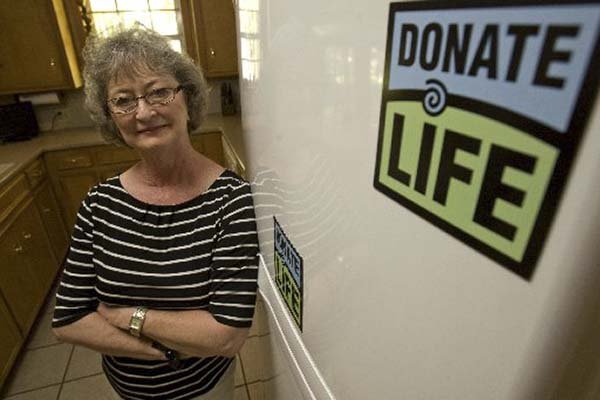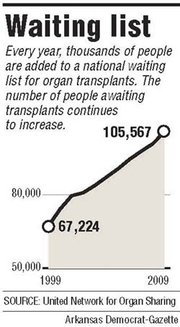LITTLE ROCK — Organ transplants make it possible for doctors to save thousands of lives a year. But like all major surgeries, there are risks.
Not all transplants are successful, and a post-transplant patient is vulnerable to infection, rejection of the new organ by his immune system, adverse medication side effects and other complications.
The Organ Procurement and Transplantation Network’s latest data on one-year survival rates for first-time transplants between 2002 and 2004 were:
87.1 percent, or 5,195 patients, for heart transplants;
91.9 percent, or 36,260 patients, for kidney transplants;
83.4 percent, or 12,928 patients, for liver transplants;
83.1 percent, or 2,641 patients, for lung transplants;
78.3 percent, or 1,045 patients, for pancreas transplants.
Going into a transplant, patients should know there could be a problem with a donor, said Susan Turton-Weeks, clinical director of solid-organ transplant at the University of Arkansas for Medical Sciences Medical Center in Little Rock.
Several tests are done to identify risk factors, such as communicable diseases. But something could go undetected.
In June 2004, for example, four patients died after receiving organs from an Arkansas donor who had contracted rabies, according to an Arkansas Democrat-Gazette article.
Some donors are designated “high risk” because of intravenous drug use or multiple sexual partners. In such cases, patients are told of a donor’s behaviors.
“It is their right to refuse a transplant,” Turton-Weeks said.
In surgery, patients face potential complications such as an adverse reaction to anesthesia or uncontrolled bleeding.
After a transplant, some immune-suppressing medications can cause serious kidney problems. Over the long term, medications can lead to diabetes or other issues such as high cholesterol, abnormal hair growth or weakening of the bones.
Infection is an ongoing risk.
Problems can develop even years later, especially if patients stray from their medications.
Drew Toler is family services manager at Arkansas Regional Organ Recovery Agency, which helps find organ donors and coordinate with transplant centers. One of his jobs is to explain the risks to a donor’s family.
“Probably one of the hardest things that we do is that follow-up phone call to that family that is so pro-donation and so wanting something good to come of it and to have to give them bad news,” he said. “That is really difficult.”
TWO NEW HEARTS
Carolyn Berry, 60, of Pine Bluff knows the risks of transplant surgery. She had a second heart transplant after her immune system attacked her first transplanted heart.
She first began having problems 15 years ago.
“I would lay down at night, and it would feel like somebody was holding a pillow over my face. I just couldn’t catch my breath,” said Berry, now retired after teaching for 20 years at Watson Chapel Junior High School.
When she finally went to the doctor, he admitted her to UAMS Medical Center immediately. She had a leaking heart valve, weakened heart muscles and an erratic and rapid heartbeat.
She was given a defibrillator implant that emitted electrical impulses to control her heart rhythm if it became irregular. Then in June 2004 she had a heart attack.
“I knew something had happened, but I didn’t know it was a heart attack,” she said.
Doctors at UAMS told her she needed a new heart.
She had her transplant on July 28, 2004. But within a month, her body started rejecting its new heart. Doctors tried several medications to no avail.
“My health was like a roller coaster,” Berry said.
By February 2007, she was told she needed another heart transplant and referred to Baptist Health Medical Center in Little Rock, where doctors had the added option of putting her on a mechanical heart pump.
“The doctors didn’t think that my heart would make it long enough for them to find another heart,” she said.
About a month later, she had her second transplant.
Berry is healthy and active three years later. She regularly works out and takes line dancing classes.
“I’ve had no rejection. I’ve had no complications,” she said.
Because of her donors, she’s lived to know her grandson and watch her husband walk their youngest daughter down the aisle.
“It gives you a different perspective on what’s important in life. Every day is a precious gift,” Berry said.
Front Section, Pages 4 on 08/09/2010

